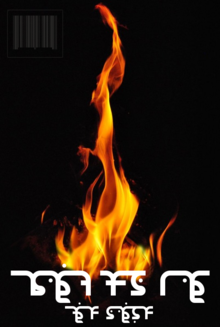Difference between revisions of "Archive:The Lesson and The Sword"
(Created page with "{{Infobox book | italic title = <!--(see above)--> | name = The Lesson and The Sword | image = Aferuunstell.png | image_size = 220px | bor...") |
|||
| Line 49: | Line 49: | ||
'''''The Lesson and The Sword''''' ([[Istani]]: '''''Aferu ũs Tell''''' /ɛ:.fɪ.ru ũ tɪtɬ/) is a novel by celebrated Istani writer, lawyer and natural philosopher [[Uram Servan]], first published after Servan's death in 1786; it's publication was proscribed during Servan's lifetime. It is considered the foremost work of literature in all of the Istani corpus, and indeed amongst the greatest works of Baredan fiction ever written; Norjihani author [[Saddan Verad Larl]] declared the work ''"Certainly the most respected work of fiction amongst our great people [The Baredans]... deeply insightful and infinitely playful"''. | '''''The Lesson and The Sword''''' ([[Istani]]: '''''Aferu ũs Tell''''' /ɛ:.fɪ.ru ũ tɪtɬ/) is a novel by celebrated Istani writer, lawyer and natural philosopher [[Uram Servan]], first published after Servan's death in 1786; it's publication was proscribed during Servan's lifetime. It is considered the foremost work of literature in all of the Istani corpus, and indeed amongst the greatest works of Baredan fiction ever written; Norjihani author [[Saddan Verad Larl]] declared the work ''"Certainly the most respected work of fiction amongst our great people [The Baredans]... deeply insightful and infinitely playful"''. | ||
The novel follows a young Istani officer | The novel follows a young Istani officer (whose name is never revealed) who follows a mysterious Xhovian fleet to the island of [[Jute]] - on the way discovering that they intend to colonise the island - and his attempts to help the Juteans stand up against Xhovian aggression. He eventually leaves the Juteans, believing they are incapable of survival, and it is assumed the Xhovians enslaved and ate the population of the island. Servan began to write the novel after failing to be admitted onto one of the Istani ''Aristocratic Committies'' (bodies who offer advice and expertise on matters being put to vote) focusing on law, being blocked by his prominent rival [[Paren Saer]]. As such, the work is a satire, indirectly attacking the Istani government of the time on numerous occassions throughout, especially Saer. The novel is often seen as being staunchly anti-interventionist and anti-colonialist, although modern criticism has attacked it for being racist, both towards the Xhovians and to other cultures (in this case, the people of Jute). | ||
Revision as of 09:41, 23 September 2018
 5th Edition (2000) Istani Front Cover | |
| Author | Uram Servan |
|---|---|
| Original title | Aferu ũs Tell |
| Country | Istan |
| Language | Istani Baredan |
| Genre |
|
| Set in | Istan, Jute |
| Published | 1786 |
The Lesson and The Sword (Istani: Aferu ũs Tell /ɛ:.fɪ.ru ũ tɪtɬ/) is a novel by celebrated Istani writer, lawyer and natural philosopher Uram Servan, first published after Servan's death in 1786; it's publication was proscribed during Servan's lifetime. It is considered the foremost work of literature in all of the Istani corpus, and indeed amongst the greatest works of Baredan fiction ever written; Norjihani author Saddan Verad Larl declared the work "Certainly the most respected work of fiction amongst our great people [The Baredans]... deeply insightful and infinitely playful".
The novel follows a young Istani officer (whose name is never revealed) who follows a mysterious Xhovian fleet to the island of Jute - on the way discovering that they intend to colonise the island - and his attempts to help the Juteans stand up against Xhovian aggression. He eventually leaves the Juteans, believing they are incapable of survival, and it is assumed the Xhovians enslaved and ate the population of the island. Servan began to write the novel after failing to be admitted onto one of the Istani Aristocratic Committies (bodies who offer advice and expertise on matters being put to vote) focusing on law, being blocked by his prominent rival Paren Saer. As such, the work is a satire, indirectly attacking the Istani government of the time on numerous occassions throughout, especially Saer. The novel is often seen as being staunchly anti-interventionist and anti-colonialist, although modern criticism has attacked it for being racist, both towards the Xhovians and to other cultures (in this case, the people of Jute).